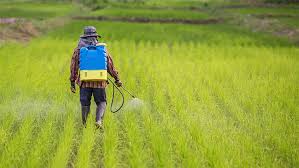
Organic farming pesticides are an integral part of sustainable agricultural practices, offering a natural approach to pest management without relying on synthetic chemicals. In organic farming, the focus is on using methods that align with ecological principles, minimize environmental impact, and promote soil health. These organic farming pesticides are derived from natural sources or are formulated to be in harmony with organic standards, providing effective pest control while supporting the broader goals of organic agriculture.

The primary principle behind organic farming pesticides is to avoid synthetic chemicals that can harm beneficial organisms, degrade soil quality, and contaminate water sources. Instead, organic farming emphasizes the use of naturally derived substances and methods that are both effective and environmentally friendly. Common organic farming pesticides include neem oil, insecticidal soap, and diatomaceous earth. Neem oil, extracted from the seeds of the neem tree, acts as a natural insect repellent and disrupts the life cycle of pests. Insecticidal soap, made from plant oils and fats, targets soft-bodied insects like aphids and whiteflies without harming beneficial insects. Diatomaceous earth, a powder made from fossilized algae, works by dehydrating and killing a range of insects through physical abrasion. These organic farming pesticides are designed to manage pest populations while maintaining the ecological balance of the farm.
Integrated Pest Management (IPM) is a holistic approach that complements the use of organic farming pesticides. IPM involves a combination of strategies to manage pests, including cultural practices, biological control, and mechanical methods. For instance, crop rotation and planting pest-resistant varieties can reduce the likelihood of pest infestations. Introducing natural predators, such as ladybugs or lacewings, helps control pest populations without chemical interventions. Mechanical methods, like traps and barriers, also play a role in minimizing pest damage. By incorporating these techniques with organic farming pesticides, farmers can achieve more comprehensive and sustainable pest management.
Another key aspect of organic farming pesticides is their impact on soil health and biodiversity. Synthetic pesticides can deplete soil nutrients, harm beneficial microorganisms, and disrupt soil structure. Organic farming pesticides, however, are designed to be less disruptive to soil ecosystems. For example, many organic pesticides break down quickly and have minimal residual effects, reducing their potential to impact soil health adversely. Additionally, by using organic farming pesticides, farmers support the presence of beneficial organisms such as earthworms and soil-dwelling insects, which contribute to soil fertility and structure.
The use of organic farming pesticides also supports the health of surrounding ecosystems and local wildlife. Synthetic pesticides can run off into waterways, affecting aquatic life and contaminating drinking water supplies. Organic farming pesticides are less likely to cause such environmental harm, as they are typically less persistent and break down more rapidly. This approach helps to preserve water quality and protect wildlife habitats, contributing to overall ecological sustainability.
Despite their benefits, organic farming pesticides are not without challenges. They can be less effective than synthetic alternatives and may require more frequent application. Additionally, their natural origins can sometimes lead to variability in effectiveness. To address these challenges, farmers must stay informed about the latest research and developments in organic pest control. This ongoing education helps ensure that they are using the most effective and up-to-date organic farming pesticides available.
Consumer awareness and demand for organic products also drive the use of organic farming pesticides. As consumers increasingly seek out food grown without synthetic chemicals, farmers are motivated to adopt and maintain organic practices. The use of organic farming pesticides aligns with consumer preferences for environmentally friendly and health-conscious agricultural methods. By meeting these demands, farmers can access niche markets and potentially achieve higher prices for their products.









